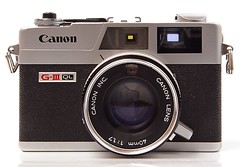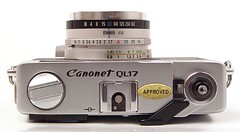Difference between revisions of "Canon Canonet QL 17 GIII"
m (→Metering and automation: minor link change) |
(→Links) |
||
| Line 38: | Line 38: | ||
* Leland So's [http://www.gaslounge.com/2007/06/canonet-ql17-g-iii.html Canonet QL17 GIII overview] with sample pictures | * Leland So's [http://www.gaslounge.com/2007/06/canonet-ql17-g-iii.html Canonet QL17 GIII overview] with sample pictures | ||
* Lionel's [http://35mm-compact.com/compact/canonetql17g3.htm Canonet QL17 GIII overview] at 35mm-compact.com | * Lionel's [http://35mm-compact.com/compact/canonetql17g3.htm Canonet QL17 GIII overview] at 35mm-compact.com | ||
| − | * [http://www.collection-appareils. | + | *[http://www.collection-appareils.fr/canon/html/Canon_canonet_GIII.php Canon Canonet GIII] at [http://www.collection-appareils.fr/general/html/francais.php Sylvain Halgand's www.collection-appareils.fr] |
| + | *[http://www.collection-appareils.fr/canon/html/Canon_canonet_GIII_noir.php Canon Canonet GIII black] at [http://www.collection-appareils.fr/general/html/francais.php Sylvain Halgand's www.collection-appareils.fr] | ||
| + | |||
Revision as of 13:11, 2 July 2008
The Canonet QL 17 GIII is the final, high-end version of Canon's famous Canonet compact rangefinder series of the 60s and 70s. It provides shutter-priority auto-exposure and parallax compensation with its 40mm f/1.7 lens. The lens is actually sharpest when wide-opensource needed, a rarity in photography that makes this an excellent camera for use in low-light. Its Copal leaf shutter offers shutter speeds from 1/4 to 1/500, with X flash sync at any speed.
Contents
Metering and automation
The meter uses a CdS cell mounted on the lens, just above the front element. It offers shutter-priority autoexposure, or unmetered manual mode. It uses a match-needle system in the viewfinder, showing apertures. There's a small fresnel lens in front of the CdS cell. When selecting a different aperture, you can see a ring with a series of perforations moving in front of the metering cell. This way, a smaller aperture gives less light on the cell. A simple, mechanical solution. Since the metering unit is placed within the filter thread, it compensates automatically for filters. Very handy.
It was designed to use the PX625 mercury battery, no longer available in the US. The circuitry in the camera holds up well against slightly higher voltages, so you can use a PX625A alkaline battery as a drop-in replacement, but you will find your exposures tend to be slightly off. Only the autoexposure system requires a battery, however. The mechanical shutter functions perfectly under manual settings with no battery whatsoever. Therefore, if you own a handheld light meter, you can use this camera without a battery.
Flash

|
A dedicated flash unit was sold with this Canonet. Since it has a hotshoe, no extra cables are required. However if you want to use another type of flash, there is a flash contact hidden beneath plastic cover on the left of the body, near the carrying eyes.
The QL 17 GIII is about 2/3 the weight of a Leica M6 with a similar lens, and is much quieter, making it an excellent alternative to higher-priced rangefinder cameras. They existed in chrome or in black. They can often be found on eBay for as little as $30, and with over a million of the cameras sold, they are fairly common at flea markets and garage sales as well.
The camera only supports a maximum film speed of 800 ASA.
Links
- Official Canon Museum Entry for GIII
- Karen Nakamura's overview at Photoethnography
- Steven Gandy's overview at Cameraquest
- Canonet QL17 versus the Leica M6 by Kyle Cassidy
- Matt Denton's overview (including repair tips)
- Repair Notes by Rick Oleson
- Henry Taber's guide to Canonet blade cleaning
- Favorite Classics on the GIII
- The Canonet QL17 FAQ
- Instruction Manuals
- kataan.org review
- The Other Martin Taylor's opinion on the GIII
- Leland So's Canonet QL17 GIII overview with sample pictures
- Lionel's Canonet QL17 GIII overview at 35mm-compact.com
- Canon Canonet GIII at Sylvain Halgand's www.collection-appareils.fr
- Canon Canonet GIII black at Sylvain Halgand's www.collection-appareils.fr
Photos
- sample photos from Anil @ arthedains.com
- Random photos from pbase
- sample photos from Dragan @ dnik.ch
- sample photos from Craig @ therangefinder.org
- Flickr QL17 group

